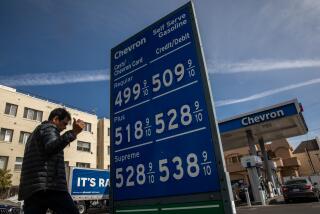Crude Oil Prices Hit 2-Year High
- Share via
Crude oil prices reached a two-year high Wednesday as the protracted strike in Venezuela continued to limit imports, sapping U.S. reserves.
Motorists in California and across the nation already are feeling the pain in the form of higher prices for gasoline. Average retail prices for regular gas at the pump rose for the fifth straight week nationally, finishing last week at $1.454, according to government price surveys.
The increases have been mirrored in California, where the average price for a gallon of regular gas at the end of last week hit $1.592.
That’s up from $1.525 on Dec. 16 and contrasts with an average of $1.182 a gallon a year ago.
The upward trend is expected to continue for the next few months, especially in California, where gas formulas are changing and several refineries are scheduled to shut down temporarily for maintenance work, said Bob van der Valk, bulk fuels manager at Cosby Oil Co. of Santa Fe Springs, an independent fuel distributor.
“All the indicators are up, and I’m predicting that gas will get to $1.75 in the next month or so,” he said.
The Venezuelan national strike, now more than 45 days long, has forced U.S. oil companies to tap their reserves and buy crude elsewhere. The shortfall reduced U.S. crude oil inventories to about 272 million barrels at the end of last week, down more than 6% from the week before, according to figures released Wednesday by the Energy Department.
The supply crunch leaves national crude oil stocks nearly 40% below year-ago levels and only slightly higher than the 270-million-barrel benchmark set by the government as the lowest level possible without causing disruptions at refineries and in the market.
Crude oil prices for February, stoked by low supplies and worries over a possible war in Iraq, on Wednesday rose 84 cents to $33.21 a barrel in New York -- the highest price in two years. Gas prices have risen in recent weeks as well.
John Felmy, chief economist for the American Petroleum Institute, said the situation “is a concern,” but he said the federal government should resist calls to tap into the Strategic Petroleum Reserve.
“We should keep our powder dry,” he said. “The SPR was not designed for price manipulation, and we might need it later on.”
More to Read
Sign up for Essential California
The most important California stories and recommendations in your inbox every morning.
You may occasionally receive promotional content from the Los Angeles Times.













